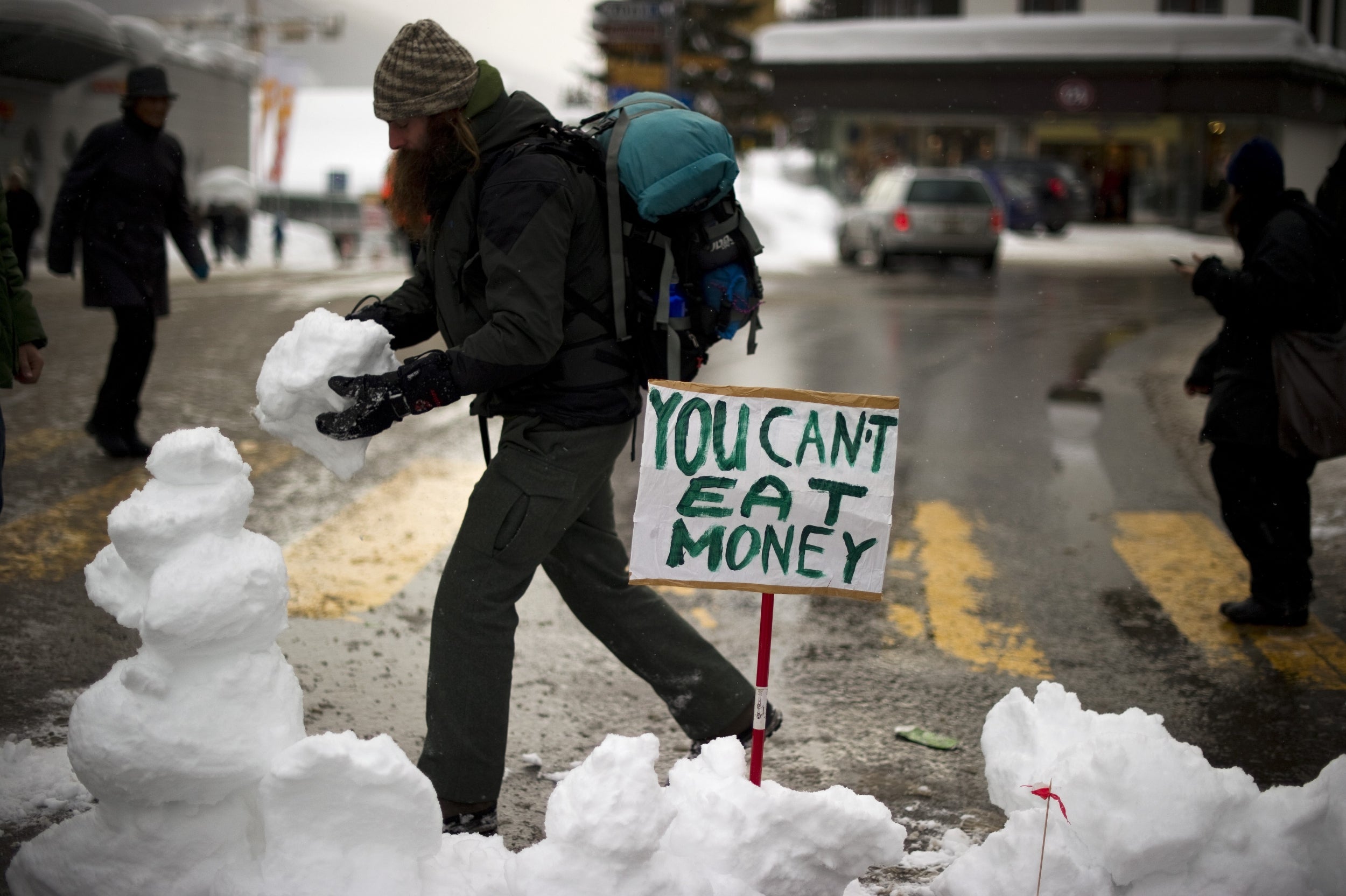Is extreme wealth a greater evil than extreme poverty?
Railing against the super-rich is all the rage, but Maarten Boudry says that instead of trying to eradicate billionaires we should instead be focused on reducing the evils of poverty

Imagine you could wave a magic wand to make one thing disappear from the world: extreme poverty or extreme wealth. Which would you choose? Let’s assume, for the sake of argument, that we won’t be liquidating anyone: we’ll just hand out and take away money, respectively. According to Oxfam’s annual report on inequality released last week, there are currently 2,153 billionaires in the world. And if we adopt the definition of poverty used by the World Bank (living on less than $1.90 per day), more than 600 million people qualify as (extremely) poor. So what will it be: a world without billionaires or one without beggars?
I hope you didn’t hesitate for even a second: of course we would want to conjure away extreme poverty. This is exactly what the United Nations has resolved to achieve by 2030 with its Millennium Goals, albeit not with a magic wand, but with the proven methods of economic development, wealth redistribution and foreign aid (or any other methods that work). Despite the tremendous progress that we have witnessed in the past three decades, 8.3 per cent of the global population is still living in absolute destitution.
A world without poverty by 2030 is not a pipe dream, but it’s not a guaranteed success either. At this point, we’re behind schedule. Ramping up our efforts and ending poverty once and for all should be the world’s top priority today. And yet, these days I find myself encountering more and more people who, judging by their rhetoric and their allocation of moral outrage, seem to consider extreme wealth the greater of the two evils, and who would even make some sacrifices in the fight against poverty if only they could get rid of billionaires.
Take the writer and activist Anand Giridharadas, who recently posted a rant against Bill Gates on Twitter, which was retweeted more than 16,000 times. Gates (estimated wealth: $110bn) had expressed misgivings about a hypothetical, truly draconian wealth tax in an interview: “I’ve paid over $10bn in taxes … If I had to pay $20bn, it’s fine. But when you say I should pay $100bn, then I’m starting to do a little math about what I have left over … I’m just kidding.” In the interview, Gates also refused to make a statement about who he would support in the next US elections.
For Giridharadas – who left out the “kidding” part by the way – this statement made Gates into some sort of moral monster. If you don’t happily give away 95 per cent of your fortune to the government, you’re just a “plute” who’s “attached to his own wealth”.
Now, I support higher taxes for billionaires too – as does Gates – but I’d have some misgivings about such an extreme wealth tax as well. Together with his wife Melinda, the founder of Microsoft has directed literally billions of dollars into highly effective programmes to fight malaria and tropical diarrhoea, a condition which still kills half a million children every year even though it is perfectly treatable. These are “unsexy” global health problems that, alas, have been woefully neglected by governments. Gates has resolved to wipe polio off the face of the earth, and it looks as if he may well succeed too. The Gates Foundation has covered the expenses for the development of a new oral vaccine against polio, and is currently stockpiling at least 100 million doses.
So what would happen with that $100bn that Gates would be paying in taxes instead, under this (completely hypothetical and politically unfeasible) tax regime? The US is currently spending less than 1 per cent of its GDP on foreign aid, and not always on the most cost-effective programmes. What are the odds that the next US administration will be donating billions to help extremely poor and needy non-US citizens? Is Uncle Sam going to use Gates’ money to continue the global fight against diarrhoea, or to buy a couple of spiffy new aircraft carriers.

Of course, Gates wouldn’t be the only billionaire to pay more taxes under this scheme, and not all of them are currently doing as much good in the world as him (though he and Warren Buffett have convinced quite a number of them to sign the Giving Pledge, giving at least half of their fortune to charity).
In a perfect world, eradicating extreme poverty and polio would be done by democratic governments using taxpayers’ money, but we aren’t living in a perfect world, and we won’t be any time soon. In the meantime, we may reasonably ask if a hefty billionaire tax would have a net positive benefit for the most destitute people on the planet.
Where are the billionaires?
1 – United States – 705 billionaires with a combined wealth of $3.013 trillion
2 – China – 285 – $996bn
3 – Germany – 146 – $442bn
4 – Russia – 102 – $355bn
5 – United Kingdom – 97 – $209bn
6 – Switzerland – 91 – $240bn
7 – Hong Kong – 87 – $259bn
8 – India – 82 – $284bn
9 – Saudi Arabia – 57 – $147bn
=10 – France – 55 – $195bn
=10 – United Arab Emirates – 55 – $165bn
If none of the tax money is spent on foreign aid, or if it is squandered on ineffective programmes, then higher taxes may well prove a net loss. Which makes me wonder: does Giridharadas have his priorities straight? Is his activism about helping poor people in whichever way possible, or is it more about ruining billionaires like Gates at all costs?
Railing against wealthy philanthropists is all the rage these days. Historian Rutger Bregman made a splash at Davos last year by scoffing at the “stupid philanthropy schemes” of the super-rich. His rousing battle cry, “Taxes, taxes, taxes, and all the rest is bullshit”, immediately went viral on social media. Well, no. How about, “Poverty, hunger, disease, and all the rest is bullshit”? Higher taxation is one possible way to combat these evils, but so is private philanthropy.
In the interest of those 600 million people who are still living utterly miserable lives today, we should be as pragmatic as possible about finding the fastest way to make progress. Taxes are a means to an end, not an end in themselves. Unless, that is, you think extreme wealth is a greater evil than extreme poverty.
Time and again, I see people who have such a visceral aversion to extreme wealth that they almost dismiss poverty reduction as a distraction from the “real” issue. When in my last book on human progress I advocated for global poverty reduction using the principles of effective altruism, a columnist of the Flemish newspaper De Standaard haughtily dismissed me as a “pseudophilosopher” beholden to vested interests.
The reason why people like me care about poverty, he wrote, is because the fight against poverty is “system-friendly”. In other words, taxing billionaires out of existence is the real deal, and helping poor people is just a sideshow to whitewash extreme wealth. Which makes me wonder: what would this guy do if he had the magic wand described above?
14.3m
People living in poverty in the UK
Perhaps you have been screaming out loud since the very beginning of this piece: “Why not get rid of both poverty and extreme wealth in one fell swoop?” In real life, after all, we are not subject to the constraints that I imposed in my thought experiment. Are not extreme poverty and extreme wealth two sides of the same coin, as Oxfam suggests in its report? Well, it’s not that simple.
Economists will tell you that the creation of wealth is not a zero-sum game in which one person can only gain at the expense of someone else losing. You can have an economic system with extreme riches but no rags, or with both, or with neither. The system that has brought down the rate of absolute poverty to less than 10 per cent of the global population (as opposed to 90 per cent during most of human history) is the same one that has spawned unprecedented levels of wealth inequality: it’s our current capitalist system.
If wealth creation worked as a zero-sum game, as when you have to slice up a pie, you would expect extreme poverty to rise in tandem with extreme wealth. But we are seeing exactly the opposite. The main reason is that the total “pie” has been multiplied several times. Economists estimate that global GDP increased by 800 per cent during the 20th century.
A charitable bunch
65 per cent of people in the UK in give to charity through donations and sponsorship in 2018, equalling £10.1bn given
Source: Charities Aid Foundation
Extreme wealth is not just a side effect of this economic growth (and thus of poverty reduction), it is also one of its key drivers: the prospect of becoming filthy rich offers people an incentive to invent new things and sell them on the market, to the benefit of all. To be clear, I think that there is still plenty of room for higher taxation before we extinguish people’s desire to get rich (especially in countries like the US). But only those who fall for zero-sum game logic will believe that higher taxation by itself can cure world poverty. Everything depends on how the money is spent afterwards.
In recent years, however, inequality (and thus extreme wealth) has developed into a full-blown obsession for many people that is totally out of proportion to the magnitude and relative importance of the problem. A typical illustration of this sentiment was expressed by the historian Tony Judt, who wrote that “of all the competing and only partially reconcilable ends that we might seek, the reduction of inequality must come first”. Really? Above poverty, hunger, disease, pollution, oppression and war? Prioritising inequality over poverty is already shameful. If your moral compass is functioning at all, you should prefer an unequal world without poverty over a world in which everyone is equally miserable.
From a global perspective, most of you who are reading this piece belong to the ‘1 per centers’, in terms of income and wealth. And all of us have the means and the power, with a few mouse clicks, to donate money
Or consider what one commentator wrote about human progress in The New Republic: “How much does it matter … that growth has skyrocketed, if the one per cent captures so substantial a part of the gains?” Well, for one thing, it matters to all those billions of people who have been lifted from poverty. If you wish to eradicate inequality above all else, you should also be careful what you wish for.
“With the rarest of exceptions,” writes economist Walter Scheidel at the end of his book The Great Leveller, “economic equality was only ever brought forth in sorrow.” The great levellers to which his title refers? War, natural disaster, violent revolution, market crashes and collapsing states. Is this the end that Tony Judt wants us to prize above anything else?
In his short but incisive book On Equality, the philosopher Harry Frankfurt argues that, unlike poverty, inequality itself is “morally innocent”. The real moral blight of the world is not that some people have too much, but rather that others have not enough. In this moral framework, the purpose of taxation should be to help poor people, not to ruin rich people. This is not to say that extreme wealth has no downsides at all.

Although inequality has in recent years been blamed for every conceivable societal evil, often with shoddy theories having a weak empirical basis, it is true that, above a certain level, it may have unwanted side effects that we should monitor and keep in check. For instance, it may create market monopolies, stifle economic growth, erode our democratic ideals (“one dollar one vote”), and foster the creation of plutocratic dynasties. But inequality itself, Frankfurt insists, is morally innocuous.
If we find some other ways to remedy those unwanted side effects – for instance, reforming campaign finance regulations – then our problem would also be solved. In any event, extreme poverty has far more serious side effects: you starve, get ill and die from diarrhoea. So what should be our priority?
Public outrage about extreme inequality often stems from noble moral sentiments. It is true that, when so many people are living on less than $2 per day, the very existence of billionaires appears offensive. In that sense, the activists have a point when they print slogans on their T-shirts such as “Billionaires should not exist”. Morally speaking, every billionaire should heed the example of Bill Gates and Warren Buffett and give away the lion’s share of their fortune. But if you think about it, and as the philosopher Peter Singer has argued for decades, a similar moral obligation applies to all of us non-billionaires as well.
From a global perspective, most of you who are reading this piece belong to the “1 per centers”, in terms of income and wealth. And all of us have the means and the power, with a few mouse clicks, to donate money to extremely cost-effective causes such as GiveDirectly or Eight.world, which help the poorest on the planet with unconditional cash transfers. It’s a deceptively simple strategy, but scientific evidence shows that it really works. According to effective altruism, the philosophy that Singer inspired, we should strive to give away 10 per cent of our income to high-impact charities.
As the late Hans Rosling wrote, our generation has the unique opportunity to end poverty once and for all: “to pick up the baton, cross the line, and raise its hands in triumph”. So, rather than waiting for the government to raise taxes and railing against billionaires, why not act right now and make the world a little better?
Join our commenting forum
Join thought-provoking conversations, follow other Independent readers and see their replies
Comments